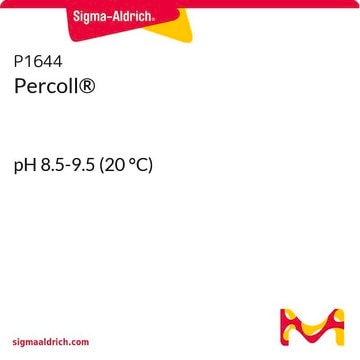GE17-5445-02
Percoll® PLUS
Cytiva 17-5445-02, pack of 250 mL
Sign Into View Organizational & Contract Pricing
All Photos(1)
About This Item
UNSPSC Code:
41105330
NACRES:
NA.75
Recommended Products
sterility
non-sterile (LOW ENDOTOXIN (2 EU/ml))
form
colloidal (Colloidal solution of silica particles coated with silane)
liquid (Suspension)
solution
packaging
pack of 250 mL
manufacturer/tradename
Cytiva 17-5445-02
color
Colorless to slightly yellow
pH range
8.9-9.9
Looking for similar products? Visit Product Comparison Guide
Related Categories
General description
Percoll® PLUS is a silica-based colloidal medium for cell separation by density gradient centrifugation. The silica particles of the medium are covalently coated with silane, providing product stability and long shelf life. The silane coating also provides low osmolality and toxicity, as well as low viscosity. Percoll PLUS is aseptically filled and has low levels of endotoxins, making it well-suited for cell separation in clinical research applications.
Cell separation with the medium is performed under gentle conditions, facilitating the isolation of a variety of cells, subcellular particles, and viruses where preservation of viability and morphological integrity is important. The low toxicity of Percoll PLUS ensures that removal of the medium from separated cellular particles is not usually necessary.
After adjustment, Percoll PLUS forms iso-osmotic gradients within the density range of 1.0 to 1.3 g/ml. This density range is especially useful since most cells, subcellular particles, and viruses have a buoyant density of 1.0 to 1.2 g/ml in Percoll PLUS.
Cell separation with the medium is performed under gentle conditions, facilitating the isolation of a variety of cells, subcellular particles, and viruses where preservation of viability and morphological integrity is important. The low toxicity of Percoll PLUS ensures that removal of the medium from separated cellular particles is not usually necessary.
After adjustment, Percoll PLUS forms iso-osmotic gradients within the density range of 1.0 to 1.3 g/ml. This density range is especially useful since most cells, subcellular particles, and viruses have a buoyant density of 1.0 to 1.2 g/ml in Percoll PLUS.
Application
Percoll PLUS can be used in density centrifugation applications for the isolation and purification of cells, subcellular particles, and viruses down to ~70S. The medium offers both high resolution and biological compatibility. The low intrinsic osmolality and viscosity are particularly useful when isolating organelles where maintenance of membrane integrity is important. Percoll PLUS can be used to produce preformed, continuous or discontinuous gradients. Under moderate centrifugal force, the colloidal particles that comprise Percoll PLUS sediment to form smooth, continuous density gradients. This property can be exploited in either fixed-angle or vertical rotors.
The medium is also suited to applications where high-speed centrifugation is required. In this case, the sample can be premixed with the medium and subsequently separated on the continuous gradient formed in situ. Thus, gradient
formation and sample separation can be achieved in one step.
All experiments described in the literature using Percoll® can also be performed with Percoll PLUS.
The medium is also suited to applications where high-speed centrifugation is required. In this case, the sample can be premixed with the medium and subsequently separated on the continuous gradient formed in situ. Thus, gradient
formation and sample separation can be achieved in one step.
All experiments described in the literature using Percoll® can also be performed with Percoll PLUS.
Features and Benefits
Percoll® PLUS offers:
- Low endotoxin levels (max. 2 EU/ml)
- Absence of toxicity for cells and very low chemical reactivity
- Low osmolality: Percoll PLUS can easily be adjusted with physiological saline, other balanced salt solutions, or cell culture media, to give gradients that are iso-osmotic throughout
- Low viscosity resulting in rapid formation of gradients and particle separation at low centrifugal forces
Storage and Stability
Please be aware this product may be shipped 90 days before the expiration date. For more information on the batch specific expiration date, please contact technical service.
Store at 4 to 30 °C ()
Analysis Note
To view the Certificate of Analysis for this product, please visit www.cytiva.com.
Legal Information
Percoll is a registered trademark of Cytiva
Storage Class Code
12 - Non Combustible Liquids
Choose from one of the most recent versions:
Certificates of Analysis (COA)
Lot/Batch Number
Sorry, we don't have COAs for this product available online at this time.
If you need assistance, please contact Customer Support.
Already Own This Product?
Find documentation for the products that you have recently purchased in the Document Library.
Customers Also Viewed
Our team of scientists has experience in all areas of research including Life Science, Material Science, Chemical Synthesis, Chromatography, Analytical and many others.
Contact Technical Service








